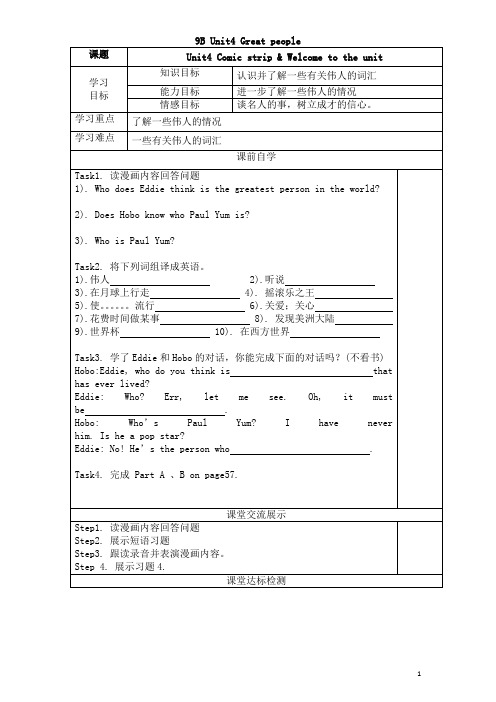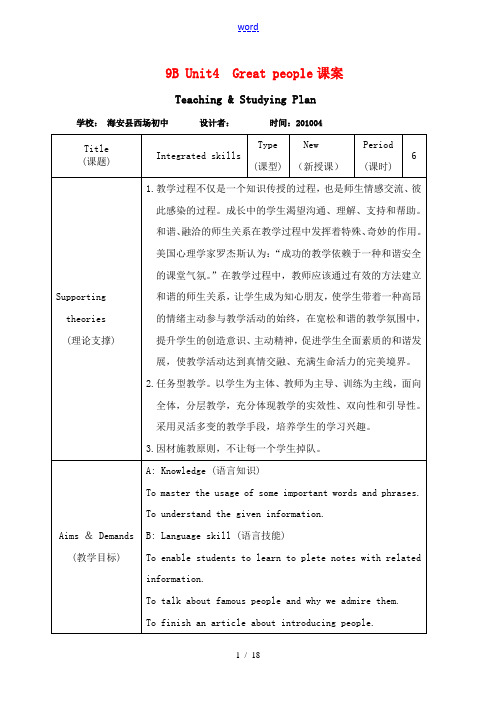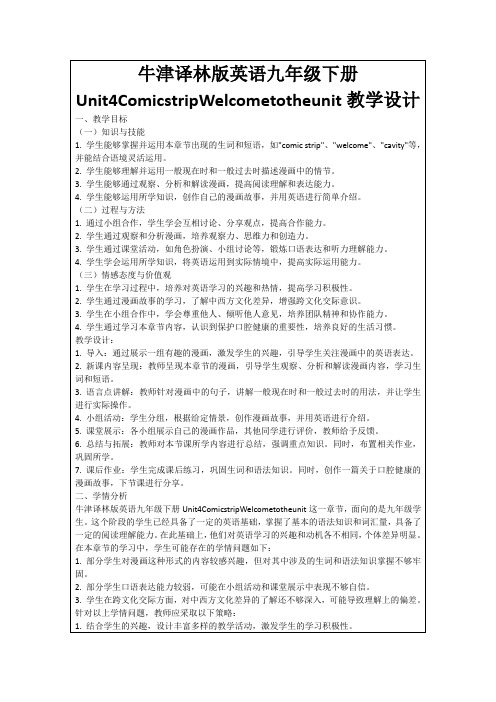九年级英语下册Unit4教案牛津版
九年级英语下册Unit4LifeonMars讲义(新版)牛津版

Life on Mars(一)重难点精讲—How do you like life on Mars?—I hate it.句中How do you like...? 意为“你觉得……怎么样?”主要用来询问对方对某事的印象,也可以改为“What do you think of ...?”。
hate “讨厌、不喜欢”,后可跟名词、代词、动名词或动词不定式。
题一:翻译:1.—你到目前为止觉得中国怎么样?—目前为止,我觉得很好。
2.我不喜欢周一。
3.我不喜欢看电视,我喜欢阅读。
4.我喜欢游泳,但是不喜欢现在去。
hate 的同义词是________, 反义词是_________。
I thought you liked Mars. 我原以为你喜欢火星。
I thought ...“我原以为……”,是指过去曾有这样的想法,但事实却不是这样。
I think ...是指现在这样认为,往往与事实是相符的。
Help Daniel compare living on Mars to living to Earth at present.句中compare “比为、比作”,常与to连用,意为“比喻、把……比作”,有时也表示“将……同……作比较”。
题二:翻译:1.我认为他是个贼。
2.我还以为他是个贼呢。
3.我们把老师比喻成蜡烛。
4.生活经常被比喻成一盒巧克力。
We will be cared for by robots.我们将由机器人来照顾。
句中care for意为“照顾、照料”,相当于look aft er / take care of。
care for 还可表示“喜欢、愿意”。
题三:翻译:1.我在妈妈不在家的时候经常照顾我的小妹妹。
2.你想喝杯咖啡吗?Food will be in the form of pills.食物将是药丸的形状。
句中in the form of ...的意思是“呈现……形状,处于某种形式”,form意为“形状,形态”。
九年级英语下册 Unit4 教案 牛津

7)What do people think the aliens tried to do?
8)What was the highest award that Neil Armstrong received?
7.What did you study when you were in the university?(engineer).
8.The whirligig(陀螺)(spin) fast a moment ago, but it stopped now.
9.He is one of the greatest(pilot) in our country.
5.完成书Page60 B1,B2。
课堂交流展示
Step1.展示重要单词用法。
Step2.展示重点句子
Step3.读课文,完成Page60 B1,B2。
Step 4阅读课文,展示问答题
Step5.跟读课文,判断题
Step6.讨论Discussion
If you are an astronaut, what do you want to do on the moon? Talk about it with your partners.
1). Who does Eddie think is the greatest person in the world?
2). Does Hobo know who Paul Yum is?
3). Who is Paul Yum?
Task2.将下列词组译成英语。
1).伟人2).听说
3).在月球上行走4).摇滚乐之王
九年级英语下册 9B Unit4 Great people课案 牛津版 教案

9B Unit4 Great people课案Teaching & Studying Plan学校:海安县西场初中设计者:时间:2010049B Unit 4学案 (Integrated skills) 【学习目标】语言知识:1. 掌握相关的词汇和短语。
2. 学会从人物简介中提取信息。
3. 学会补全笔记。
语言技能:能用所学结构谈论名人以及我们钦佩他们的原因。
情感态度:以名人为榜样,现在努力学习将来为社会多作贡献。
【学习重难点】1. 如何谈论名人以及我们钦佩他们的原因。
2. 完成一篇介绍人物的文章。
课前延伸课前导学练习一、根据中文、首字母提示及句意写出单词。
1. Do you know who invented (X光) machines?2. The future is always (未知的) to us.3. A c only have one child in most cities in china.4. My friend is a F, and he es from Paris.5. Maths is short for .二、收集有关居里夫人的信息,并能通过、文字、图片等进行描述。
自主学习记录卡课内探究课中训练Ⅰ.Read the following information and then answer some questions.Marie Curie was born in the city of Warsaw in Poland. When she was 24, she moved to France and studied mathematics and physics .She married a Frenchman called Pierre Curie there. In 1898, they discovered radium. Marie Curie received the Nobel Prize twice during her lifetime. She died at the age of 67.1.Where was Marie Curie born?2.What did she study in France?3.What were she and her husband famous for?4.How many times did she receive the Nobel Prize?Keys:In the city of Warsaw in PolandMathematics and physicsThe discovery of radiumTwiceⅡ. Finish some of PartA1 with as much information as you can.12. discovering; 18.67Ⅲ.plete the rest of PartA1 after listening.Keys:3. the youngest; 4. Science;14. traffic th JulyⅣ. Use the information in PartA1 to finish PartA3.. Keys: 1.Warsaw in Poland6. Frenchman;7.Nobel Prize;8.radium;9.Second Nobel PrizeⅤ. plete the following dialogue.Millie: Who do you think is the g 1 person that has ever lived?Simon: Neil Armstrong! I a 2 him the most.Millie: What did Neil Armstrong do?Simon: He was the f 3 man that walked on the moon.Millie: Why do you admire him?Simon: Because he was a b4 man to go to a place that was u 5 to humans at that time. What a 6 you? Do you admire anybody?Millie: Yes. I admire Marie Curie. She d 7 radium and i 8 X-ray machines.Simon: Why do you admire her?Millie: Because X-ray machines are now u 9 all over the world to help doctors s lives.Ⅵ. WritingMarie Curie is one of the world’s most famous women.She was bornWe should learn from her..Marie Curie is one of the world’s most famous women.She was born on 7th November 1867. She was born in Warsaw, a city in Poland. She was the fifth and the youngest child of her family. When she was 24, she left Poland and went to Paris to study at a university there. She studied maths and physics. She married a Frenchman called Pierre Curie. The couple won a Nobel Prize for the discovery of radium in 1903. In 1911, she was awarded her second Nobel Prize. She died at the age of 67.We should learn from her. We should study hard today sothat we can do more for the society.课后提升课后提升一、句型转换。
牛津译林版英语九年级下册Unit4ComicstripWelcometotheunit教学设计

1.部分学生对漫画这种形式的内容较感兴趣,但对其中涉及的生词和语法知识掌握不够牢固。
2.部分学生口语表达能力较弱,可能在小组活动和课堂展示中表现不够自信。
3.学生在跨文化交际方面,对中西方文化差异的了解还不够深入,可能导致理解上的偏差。
针对以上学情问题,教师应采取以下策略:
牛津译林版英语九年级下册Unit4ComicstripWelcometotheunit教学设计
一、教学目标
(一)知识与技能
1.学生能够掌握并运用本章节出现的生词和短语,如"comic strip"、"welcome"、"cavity"等,并能结合语境灵活运用。
2.学生能够理解并运用一般现在时和一般过去时描述漫画中的情节。
2.练习题包括选择题、填空题、改错题等,涵盖生词、短语、语法等方面。
3.学生独立完成练习题,教师给予反馈和指导。
4.教师针对练习题中的共性问题,进行讲解和解答。
(五)总结归纳(500字)
1.教师对本节课所学内容进行总结,强调重点知识。
2.学生分享自己在课堂上的收获和感悟。
3.教师布置相关作业,巩固所学知识。
3.学生能够通过观察、分析和解读漫画,提高阅读理解和表达能力。
4.学生能够运用所学知识,创作自己的漫画故事,并用英语进行简单介绍。
(二)过程与方法
1.通过小组合作,学生学会互相讨论、分享观点,提高合作能力。
2.学生通过观察和分析漫画,培养观察力、思维力和创造力。
3.学生通过课堂活动,如角色扮演、小组讨论等,锻炼口语表达和听力理解能力。
4.情境模拟:设置真实的跨文化交际情境,让学生在实际交流中运用所学文化背景知识。
沪教牛津版九年级下册英语 Unit 4 4. Writing 教案

精品文档精心整理Unit 4 Natural disasters课题: Unit 4 Natural disasters课时: 第 4 课时,共 4 课时课型: Writing教学目标:知识目标To grasp how to write a short article.Master the skills of writing a notice.能力目标To develop the ability of writing.To improve writing skills.情感目标Through writing to have a better understanding of the importance of knowledge of survival .教学重点: The skills of writing a notice.教学难点: Cultivate the concept of protection against disasters.教学步骤:Step1: Lead ine the More practice part to check the Ss ability of fast reading.T: How much do you know an ice storm? Read the passage and tell me.Help students think about the questions.2. DiscussionIn pairs discuss the questions.(讨论总结,以书面的形式总结报告)Step2: Presentation1.T:Say:Read the short report below about a typhoon. Then discuss with your classmates what you can do to help the homeless. .(1).Ask the students to finish the questions.(2).Guide students to learn to write a notice.(通过给出的要点,帮助学生组织句子,通顺全文)2.Explanation.(1)Explain main points about writing a notice.(2)Brainstorming.Elements of a notice.(通过学生之间的讨论,总结出a notice的要点)3. Example(有关自然灾害的中考作文)(边展示课件,边讲解,进行亮点赏析,提示学生注意点)Step3.DiscussionGroup work.Choose one from the four natural disasters to discuss in groups.Which group is the best? (通过团队合作,取长补短,加深印象)Step 4: Homework1.Finish the writing exercises inLearning English.2. To preview More practice on page 613. Write something about how to survive an earthquake .4. Review Unit4.精品文档可编辑的精品文档。
牛津译林版英语九年级下册Unit 4 Life on Mars Grammar 学案(含答案)

Unit 4 Life on MarsGrammar一、定语从句转化介词短语①如果定语从句中的谓语动词have表示“有”的含义, 从句可转换成由with构成的介词短语作后置定语。
People might live in houses which have huge comfortable rooms.→People might live in houses with huge comfortable rooms.On Mars you might see people who wear special boots.→On Mars you might see people in special boots.②若定语从句结构关系词+主+be/关系词+be+介词短语的形式,可省略关系词+be/关系词+主语+beWe have never forgotten the days when we were at college.→We have never forgotten the days at college.I don’t know the person who is in your office.→I don’t know the person in your office.二、定语从句转化分词短语分词短语作后置定语,现在分词与名词是主谓关系表主动,过去分词与名词是动宾关系表被动。
Anyone who touches that wire will get an electric stock.→Anyone touching that wire will get an electric stock.I’d like to make some comments on the meeting which was held yesterday.→I’d like to make some comments on the meeting held yesterday.三、定语从句转化形容词短语若定语从句中的结构为关系代词+be+adj., 可以去掉关系代词+be,形容词短语作后置定语。
初中英语九年级下册(牛津译林版)Unit4Reading教学设计
1.教师将学生分成若干小组,每组选择一个人物进行讨论,要求小组成员共同完成人物描述的任务。
2.各小组成员分工合作,收集与所讨论人物相关的信息,如外貌、性格、爱好等。
3.小组内进行讨论,运用所学词汇和句型进行人物描述,形成小组的共同成果。
4.各小组展示讨论成果,其他同学认真倾听,并给予评价和建议。
(五)总结归纳
1.教师引导学生回顾本节课所学内容,总结描述人物特征的方法和技巧。
2.学生分享在本节课中学到的知识和收获,交流学习心得。
3.教师强调本节课的重点知识,提醒学生注意在课后加强巩固。
4.布置课后作业,要求学生运用所学知识描述一个熟悉的人物,并进行同伴互评。
5.教师鼓励学生在日常生活中多观察、多描述,提高英语实际运用能力。
(3)提高学生的听说读写综合运用能力,尤其是口语表达和书面表达能力。
2.难点:
(1)如何引导学生运用一般现在时和一般过去时描述人物的外貌、性格、爱好及其优缺点。
(2)如何帮助学生在阅读过程中抓住文章主旨,进行有效的信息筛选和整合。
(3)如何激发学生的学习兴趣,提高他们的英语学习动机,使他们在课堂上积极参与各种活动。
初中英语九年级下册(牛津译林版)Unit4Reading教学设计
一、教学目标
(一)知识与技能
在本章节的教学中,学生将通过学习Unit 4 Reading部分,掌握以下知识与技能:
1.理解并运用与日常生活相关的英语词汇和句型,如:describe, appearance, character, hobby, advantage, disadvantage等。
5.教师对每个小组的表现进行点评,指出优点和不足,指导学生进一步提高。
(四)课堂练习
新版牛津版2020-2021学年九年级英语下册Unit4LifeonMarsGrammar教案
Unit4 Grammar一、教学目标1. 正确熟练地运用从句和简单句。
2. 掌握简单句和复合句之间的转换。
二、教学内容掌握词汇:aware, circle, agreement, distance, possibility, alien, stranger。
词组:as tasty as, remind of, how far, be away from, two earth years, circle around the Sun. work hard, come true, be different from, try to do, be similar to, sign of, be happy to do, indoor playground, the football field, the same as, hear from。
句型:(1)People might float in space because of the low gravity.(2)Humans cannot survive without food, water, or oxygen.(3)The smell of the pills reminds them of the tasty food on the Earth.(4)It takes Mars about two Earth years to circle around the Sun once.(5)I wonder how many people would like to move to Mars.(6)It is difficult to breathe on a planet that has much thinner air than that on the Earth.三、重点难点1. 正确熟练地运用从句和简单句。
2. 掌握简单句和复合句之间的转换。
九年级英语下册Unit4教案牛津版
山东省乳山市夏村镇初级中学九年级英语下册《Unit5 I like music that I can dance to》教案牛津版教学目标1. 学会不同时间段的表达法;2. 学会用频度副词谈论自己的日常生活及日常作息习惯;3. 学习合理安排时间,加强时间的计划性。
4 能用所学知识对某一活动进行合理安排。
教学内容1. 单元词汇what time,go to school,up,get up,run,shower,take a shower,always, morning,o’clock,work, go to bed, do homework,go home ,start, wish, letter, love, home, morning, job, evening, afternoon, around, me, tell, write, Saturday, survey, all, bus, get to, night, listen, soon.2.句型(1) What time do you get up/have breakfast/go to school?I us ually get up/have breakfast/go to school at ….(2) When does your mother go to work?She goes to work at 7:00.(3) What time is it?It’s eleven o’clock.(4)He brushes his teeth and has a shower.(5)To get to work, he takes the number 17 bus to hotel.(6)The bus takes him to work at 7.(7)He works all night.(8)People love to listen to him.(9)Do you want to know about my moring ?(10)School stars at nine clock.(11)Please write and tell me about your moring.3.精讲点拨:关于时间(time)的介词小结:(1)at:主要表示某时刻、某时段(固定搭配)如,at six o’clockat nightat first(2) on: 主要表示某一天,也可以表示一天的时段,如:on June firston New Year’s Dayon Monday afternoon(3) in: 主要表示长于一天或固定结构中或一段时间之内,如,in Januaryin springin the dayin those days拓展练习:一、词汇大本营根据句意和提示填写单词1 Which ______( 旅馆)do you like?2 T_____ for your letter.3 She u_____ goes to bed at 10:00.4 He often _______________ on Sunday.5 What time does he do his h_______?6 He b_______ his teeth and has a s________.7 People love to l______ to him!8 Tell me a_____ your morn ing.二. 连词成句1. our 2:00 finish all at classes2. time you do up what get3. o'clock at she to eight goes school4. u sually eat people the in dinner evening5. yourself please and tell write me about6. morning want about do to you know my三、翻译下列句子。
Unit4Task学案牛津译林版英语九年级下册
Unit 4 Task【学习目标】1.能记住并能正确运用本节课词汇goods, electronic, entertainment。
2.能用蛛网图准确地表达自己的想法。
3.能用英语写出关于去另一个星球的指南。
【预习导学】一、词汇记忆1.货物2.电子的3.娱乐4.火星生活指南5.没有空气污染二、头脑风暴。
与同伴交流,写出关于火星的词汇。
______________________________________________________________三、想一想。
你希望火星是什么样子的?你对去火星有什么打算?请你写下来。
________________________________________________________________________________________________________________________________________________________________________________________________________________________________________________________【答案】一、词汇记忆1.goods2.electronic3.entertainment4.a guide to living on Mars5.with no air pollution二、头脑风暴。
与同伴交流,写出关于火星的词汇。
Mars, planet, gravity, helmet, air tank, power pack, crowded, polluted, space, oxygen, alien 三、想一想。
你希望火星是什么样子的?你对去火星有什么打算?请你写下来。
略。
【合作探究】任务驱动一学习绘制蛛网图1.假如你要到某个地方旅游,你希望以下几个方面的情况是怎样的呢?与同伴交流后补充填表。
- 1、下载文档前请自行甄别文档内容的完整性,平台不提供额外的编辑、内容补充、找答案等附加服务。
- 2、"仅部分预览"的文档,不可在线预览部分如存在完整性等问题,可反馈申请退款(可完整预览的文档不适用该条件!)。
- 3、如文档侵犯您的权益,请联系客服反馈,我们会尽快为您处理(人工客服工作时间:9:00-18:30)。
山东省乳山市夏村镇初级中学九年级英语下册《Unit5 I like music that I can dance to》教案牛津版
教学目标
1.学会不同时间段的表达法:
2.学会用频度副词谈论自己的日常生活及日常作息习惯:
3.学习合理安排时间,加强时间的计划性。
4能用所学知识对某一活动进行合理安排。
教学内容
1.单元词汇
what time, go to school • up, getup, runt shower» take a shower t> always, mornings o* clock, work, go to bed» do homeworks go home , start, wish, letter, love, home, morning, job, evening, afternoon, around, me, tell, write, Saturday, survey, all, bus, get to, nighty listen, soon.
2.句型
(1)What time do you get up/have breakfast/go to school?
I usually get up/have breakfast/go to school at ….
(2)When does your mother go to work?
She goes to work at 7:00・
(3)What time is it?
It * s eleven o' clock・
(4)He brushes his teeth and has a shower・
(5)To get to work, he takes the number 17 bus to hotel・
(6)The bus takes him to work at 7・
(7)He works all night・
(8)People love to listen to him・
(9)Do you want to know about my moring ?
(10)School stars at nine clock・
(11)Please write and tell me about your moring・
3•精讲点拨:
关于时间(time)的介词小结:
(1)at:主要表示某时刻、某时段(固定搭配)如,
at six o' clock
at night
at first
(2)on:主要表示某一天,也可以表示一天的时段,如:
on June first
on New Year* s Day
on Monday afternoon
(3)in:主要表示长于一天或固左结构中或一段时间之内,如,
in January
in spring in the day
in those days
拓展练习:
一、词汇大本营 根据句意和提示填写单词
1 Which _____ (旅馆)do you like/?
2 T ____ for your letter ・
3 She u _____ goes to bed at 10:00.
4 He often _________________ on Sunday.
5 Whet time does he do his h ____________ ?
6 He b ______ his teeth and has a s _____________ .
7 People love to 1 ________ to him!
8 Tell me a ______ your morrting ・
二. 连词成句
三. 翻译下列句子.
1你通常什么时候做作业?4:50.
2你爸爸何时上班? 700o
3她妈妈几点睡觉? 11:00。
4她什么时候上学?7:25o
5 Mary 什么时候起床? 5: 30。
6在这个时候吃早饭是多么有趣的事啊!
7请写信告诉我你早晨的事。
8学校8: 00开始上课。
用适当的词填空,补全下面的短文:
I usually _________ (起床)at _______ ・ I have milk and bread for brea^kfast ・ After
breakfast, I __________ (洗澡)and then I _________ (上学)by bus. I get to school at I have five classes in the morning ・ And then I have lunch at
・ In the afternoon I have two classes ・ I (回家)at ・ I get home at 4:30
1. our 2:00
finish all at classes 2. time
3. 4・
o. 6. you do up what get at she to eight goes school eat people the Ln dinner evening please and tell write me about want about do to you know
my o' clock
usually yourself
morning
p. m. I _______ (吃晚饭)at about __________ ・ After dinner, I _________ (做&作业)・ I ______ (睡觉)at ________ ・ My life is busy but not exciting.
阅读理解
On weekdays, David gets up at 6:30・ He has breakfast at seven, and then he goes to school by bus ・ He gets there at 7:15・ He doesn't like to be late ・ Classes begin at 8:00・ He has lunch at twelve at school ・ He goes home at 5:30 in the afternoon ・ On weekends, he gets up at about 8:00 and makes breakfast for his family. His parents like him very much.
( )1 ・ David gets up at 6:30 ___________
)5. Which of the following is right? A. David wakes up at 6:30 on weekdays ・ B ・ David's first
class begins at 8:00. C ・ David is often late for schoo 1・
D. David always gets home at5:30・
作业:
A. every day B ・ on Sunday C ・ on weekdays
D ・ on Saturdays
)2. David goes
to school A. by a bike
B ・ by bus
C ・ by cars D. No. 3 bus )3. He has
at twelve at school. A. breakfast
B ・ lunch
C ・ classes
D ・ supper )4.
makes breakfast for the family on Sundays. A. David
B. Mother
C. Father
D. I
XI.根。
